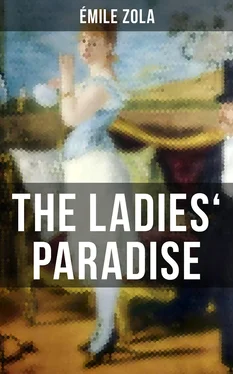“Hush! seventeen!” said he, quickly, to his colleague, to warm him by this peculiar cry of the approach of Mouret and Bourdoncle.
These latter were continuing their inspection by traversing the hall. They stopped to ask Robineau for an explanation with regard to a stock of velvets of which the boxes were encumbering a table. And as the latter replied that there wasn’t enough room:
“I told you so, Bourdoncle,” cried out Mouret, smiling; “the place is already too small. Vie shall soon have to knock down the walls as far as the Rue de Choiseul. You’ll see what a crush there’ll be next Monday.”
And respecting the coming sale, for which they were preparing at every counter, he asked Robineau further questions and gave him various orders. But for several minutes, and without having stopped talking, he had been watching Hutin, who was contrasting the silks—blue, grey, and yellow—drawing back to judge of the harmony of the tones. Suddenly he interfered:
“But why are you endeavoring to please the eyes? Don’t be afraid; blind them. Look! red, green, yellow.”
He had taken the pieces, throwing them together, crushing them, producing an excessively fast effect. Everyone allowed the governor to be the best displayer in Paris, of a regular revolutionary stamp, who had founded the brutal and colossal school in the science of displaying. He delighted in a tumbling of stuffs, as if they had fallen from the crowded shelves by chance, making them glow with the most ardent colors, lighting each other up by the contrast, declaring that the customers ought to have sore eyes on going out of the shop. Hutin, who belonged, on the contrary, to the classic school, in which symmetry and harmony of color were cherished, looked at him lighting up this fire of stuff on a table, not venturing on the least criticism, but biting his lip with the pout of an artist whose convictions are wounded by such a debauch.
“There!” exclaimed Mouret when he had finished. “Leave it; you’ll see if it doesn’t fetch the women on Monday.”
Just as he rejoined Bourdoncle and Robineau, there arrived a woman, who remained stock-still, suffocated before this show. It was Denise, who, having waited for nearly an hour in the street, the prey to a violent attack of timidity, had at last decided to go in. But she was so beside herself with bashfulness that she mistook the clearest directions; and the shopmen, of whom she had stutteringly asked for Madame Aurélie, directed her in vain to the lower staircase; she thanked them, and turned to the left if they told her to turn to the right; so that for the last ten minutes she had been wandering about the ground-floor, going from department to department, amidst the ill-natured curiosity and ill-tempered indifference of the salesmen. She longed to run away, and was at the same time retained by a wish to stop and admire. She felt herself lost, she, so little, in this monster place, in this machine at rest, trembling for fear she should be caught in the movement with which the walls already began to shake. And the thought of The Old Elbeuf, black and narrow, increased the immensity of this vast establishment, presenting it to her as bathed in light, like a city with its monuments, squares, and streets, in which it seemed impossible that she should ever find her way.
However, she had not dared to risk herself in the silk hall, the high glass roof, luxurious counters, and cathedral-like air of which frightened her. Then when she did venture in, to escape the shopmen in the linen department, who were grinning, she had stumbled right on to Mouret’s display; and, notwithstanding her fright, the woman was aroused within her, her cheeks suddenly became red, and she forgot everything in looking at the glow of these silks.
“Hullo!” said Hutin in Favier’s ear; “there’s the girl we saw in the Place Gaillon.”
Mouret, whilst affecting to listen to Bourdoncle and Robineau, was at heart flattered by the startled look of this poor girl, as a marchioness might be by the brutal desire of a passing drayman. But Denise had raised her eyes, and her confusion increased at the sight of this young man, whom she took for a manager. She thought he was looking at her severely. Then not knowing how to get away, quite lost, she applied to the nearest shopman, who happened to be Favier.
“Madame Aurélie, please?”
But Favier, who was disagreeable, contented himself with replying sharply: “First floor.”
And Denise, longing to escape the looks of all these men, thanked him, and had again turned her back to the stairs she ought to have mounted, when Hutin, yielding naturally to his instinct of gallantry, stopped her with his most amiable salesman’s smile,
“No—this way, mademoiselle; if you don’t mind.”
And he even went with her a little way to the foot of the staircase on the left-hand side of the hall under the gallery. There he bowed, smiling tenderly, as he smiled at all women.
“When you get upstairs turn to the left. The dress department is straight in front.”
This caressing politeness affected Denise deeply. It was like a brotherly hand extended to her; she raised her eyes and looked at Hutin, and everything in him touched her—his handsome face, his looks which dissolved her fears, and his voice which seemed to her of a consoling softness. Her heart swelled with gratitude, and she bestowed her friendship in the few disjointed words her emotion allowed her to utter.
“Really, sir, you are too kind. Pray don’t trouble to come any further. Thank you very much.”
Hutin had already rejoined Favier, to whom he coarsely whispered: “What a bag of bones—eh?”
Upstairs the young girl suddenly found herself in the midst of the dress department. It was a vast room, with high carved oak cupboards all round, and clear glass windows looking on to the Rue de la Michodière. Five or six women in silk dresses, looking very coquettish with their frizzed chignons and crinolines drawn back, were moving about, talking. One, tall and thin, with a long head, having a runaway-horse appearance, was leaning against a cupboard, as if already knocked up with fatigue.
“Madame Aurélie?” inquired Denise.
The saleswoman looked at her without replying, with an air of disdain for her shabby dress, then turning to one of her friends, a short girl with a sickly white skin and an innocent and disgusted appearance, she asked: “Mademoiselle Vadon, do you know where Madame Aurélie is?”
The young girl, who was arranging some mantles according to their sizes, did not even take the trouble to raise her head. “No, Mademoiselle Prunaire, I don’t know at all,” replied she in a mincing tone.
A silence ensued. Denise stood still, and no one took any further notice of her. However, after waiting a moment, she ventured to put another question: “Do you think Madame Aurélie will be back soon?”
The secondhand, a thin, ugly woman, whom she had not noticed before, a widow with a projecting jaw-bone and coarse hair, cried out from a cupboard, where she was checking some tickets: “You’d better wait if you want to speak to Madame Aurélie herself.” And, addressing another saleswoman, she added: “Isn’t she downstairs?”
“No, Madame Frédéric, I don’t think so,” replied the young lady. “She said nothing before going, so she can’t be far off.”
Denise, thus instructed, remained standing. There were several chairs for the customers; but as they had not told her to sit down, she did not dare to take one, although she felt ready to drop with fatigue. All these ladies had evidently put her down as an applicant for the vacancy, and they were taking stock of her, pulling her to pieces ill-naturedly, with the secret hostility of people at table who do not like to close up to make room for hungry outsiders. Her confusion increased; she crossed the room quietly and looked out of the window into the street, just for something to do. Opposite, The Old Elbeuf, with its rusty front and lifeless windows, appeared to her so ugly, so miserable, seen thus from amidst the luxury and life of her present standpoint, that a sort of remorse filled her already swollen heart with grief.
Читать дальше












